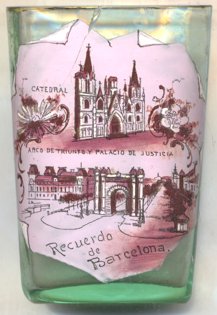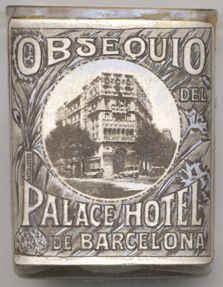

|
| ESPAÑA | Spain |
| Catalunya / Cataluña | Catalonia |
| Provincia: Barcelona | Barcelona |
Barcelona, the capital and largest city of the autonomous community of Catalonia, is situated at the northeastern coast of Spain. With a population of 4,84 million for the city proper and 5,47 million for the metropolitan area it is the second-most populous municipality of Spain and the fifth most populous urban area in the European Union after Paris, the Ruhr area, Madrid and Milano.
The first human settlements in Barcelona date back to Neolithic times. The city itself was founded by the Romans who set up a colony called Barcino at the end of the 1st century BC. For over 200 years, Barcelona was under Muslim rule, and, following the Christian reconquest, it became a county of the Carolingian Empire and one of the main residences of the court of the Crown of Aragon. The fruitful medieval period established Barcelona's position as the economic and political centre of the Western Mediterranean. The city's Gothic Quarter bears witness to the splendour enjoyed by the city from the 13th to the 15th centuries. From the 15th to 18th centuries Barcelona entered a period of decline, while it struggled to maintain its economic and political independence. This struggle ended in 1714, when the city fell to the Bourbon troops and Catalonia's and Catalans' rights and privileges were suppressed. A period of cultural recovery began in the mid-19th century with the arrival of the development of the textile industry. During this period, which was known as the Renaixença, Catalan regained prominence as a literary language. The 20th century ushered in widespread urban renewal throughout Barcelona city, culminating in its landmark Eixample district, which showcases some of Barcelona's most distinctive Catalan art-nouveau, or modernista, buildings. The Catalan Antoni Gaudí, one of the most eminent architects, designed buildings such as the Casa Milà, the Casa Batlló and the Sagrada Família church, which have become world-famous landmarks. The city's hosting of the 1992 Olympic Games gave fresh impetus to Barcelona's potential and reaffirmed its status as a major metropolis.

The  Cathedral of the Holy Cross and Saint Eulalia (Catedral de la Santa Creu i Santa Eulàlia)
[left, no. 4747: top picture] is the seat of the Archbishop of Barcelona. The cathedral was constructed from the
13th to 15th centuries, with the principal work done in the 14th century. The cloister was completed in 1448. Its form is a
pseudo-basilica, vaulted over five aisles, the outer two divided into chapels. The transept is truncated. The east end is a chevet of
nine radiating chapels connected by an ambulatory. The high altar is raised, allowing a clear view into the crypt. The view of the
cathedral depicted on the glass shows the western façade of the cathedral as it looked until the eod of the 18th century.
Today's appearance of the western façade with its impressive neo-Gothic middle tower was created in 1886–1913. The church
is designated as a Spanish cultural heritage (Bien de Interés Cultural) since 1929.
Cathedral of the Holy Cross and Saint Eulalia (Catedral de la Santa Creu i Santa Eulàlia)
[left, no. 4747: top picture] is the seat of the Archbishop of Barcelona. The cathedral was constructed from the
13th to 15th centuries, with the principal work done in the 14th century. The cloister was completed in 1448. Its form is a
pseudo-basilica, vaulted over five aisles, the outer two divided into chapels. The transept is truncated. The east end is a chevet of
nine radiating chapels connected by an ambulatory. The high altar is raised, allowing a clear view into the crypt. The view of the
cathedral depicted on the glass shows the western façade of the cathedral as it looked until the eod of the 18th century.
Today's appearance of the western façade with its impressive neo-Gothic middle tower was created in 1886–1913. The church
is designated as a Spanish cultural heritage (Bien de Interés Cultural) since 1929.
The  Arch of Triumph (Arc de Triomf) [bottom picture: foreground right] was built by
architect Josep Vilaseca i Casanovas as the main access gate for the 1888 Barcelona World Fair. The arch is built in reddish
brickwork in the neo-Mudéjar style.
Arch of Triumph (Arc de Triomf) [bottom picture: foreground right] was built by
architect Josep Vilaseca i Casanovas as the main access gate for the 1888 Barcelona World Fair. The arch is built in reddish
brickwork in the neo-Mudéjar style.
The  Palace of Justice (Palau de Justícia) [bottom picture: background left] was
built between 1887 and 1908 to house the judicial authorities and the courtrooms in a single building. The Barcelona City Council
commissioned Josep Domènech i Estapà and Enric Sagnier as architects for the project. building has been protected
as an Asset of Cultural Interest since 2000.
Palace of Justice (Palau de Justícia) [bottom picture: background left] was
built between 1887 and 1908 to house the judicial authorities and the courtrooms in a single building. The Barcelona City Council
commissioned Josep Domènech i Estapà and Enric Sagnier as architects for the project. building has been protected
as an Asset of Cultural Interest since 2000.
Glass no. 4747 is labeled in Spanish: Catedral / Arco de Triunfo y Palacio de Justicia / Recuerdo de Barcelona.

The  Hotel Palace was built in 1919 by César Ritz, the father of the modern luxury hotel industry. Sadly, César
Ritz passed away in 1918, before the Ritz of Barcelona was completed. Since opening in 1919, El Palace Barcelona has participated in all of the important periods
in Barcelona’s history. In 1936, the hotel was seized by the FOSIG (Federación Obrera de Sindicatos de la Industria Gastronómica) and unionised.
They hoped to socialise the hotel industry and eliminate ostentation, renaming the hotel Hotel Gastronómico N.º1. The government regained control
of the hotel in 1937, using it to house official visitors. In the end, the Ritz of Barcelona was able to return to its initial spirit and calling — instead
of being turned into the headquarters for the Finance Department. After more than a century in existence, El Palace Barcelona aims to remaining a place where
art, culture, gastronomy, and life all come together.
Hotel Palace was built in 1919 by César Ritz, the father of the modern luxury hotel industry. Sadly, César
Ritz passed away in 1918, before the Ritz of Barcelona was completed. Since opening in 1919, El Palace Barcelona has participated in all of the important periods
in Barcelona’s history. In 1936, the hotel was seized by the FOSIG (Federación Obrera de Sindicatos de la Industria Gastronómica) and unionised.
They hoped to socialise the hotel industry and eliminate ostentation, renaming the hotel Hotel Gastronómico N.º1. The government regained control
of the hotel in 1937, using it to house official visitors. In the end, the Ritz of Barcelona was able to return to its initial spirit and calling — instead
of being turned into the headquarters for the Finance Department. After more than a century in existence, El Palace Barcelona aims to remaining a place where
art, culture, gastronomy, and life all come together.
[https://en.wikipedia.org/wiki/Barcelona;
https://www.barcelonaturisme.com/wv3/en/page/43/history-of-barcelona.html;
https://en.wikipedia.org/wiki/Barcelona_Cathedral, https://de.wikipedia.org/wiki/Kathedrale_von_Barcelona;
https://en.wikipedia.org/wiki/Arc_de_Triomf;
https://www.hotelpalacebarcelona.com/heritage]
![[scale]](lineal.jpg)